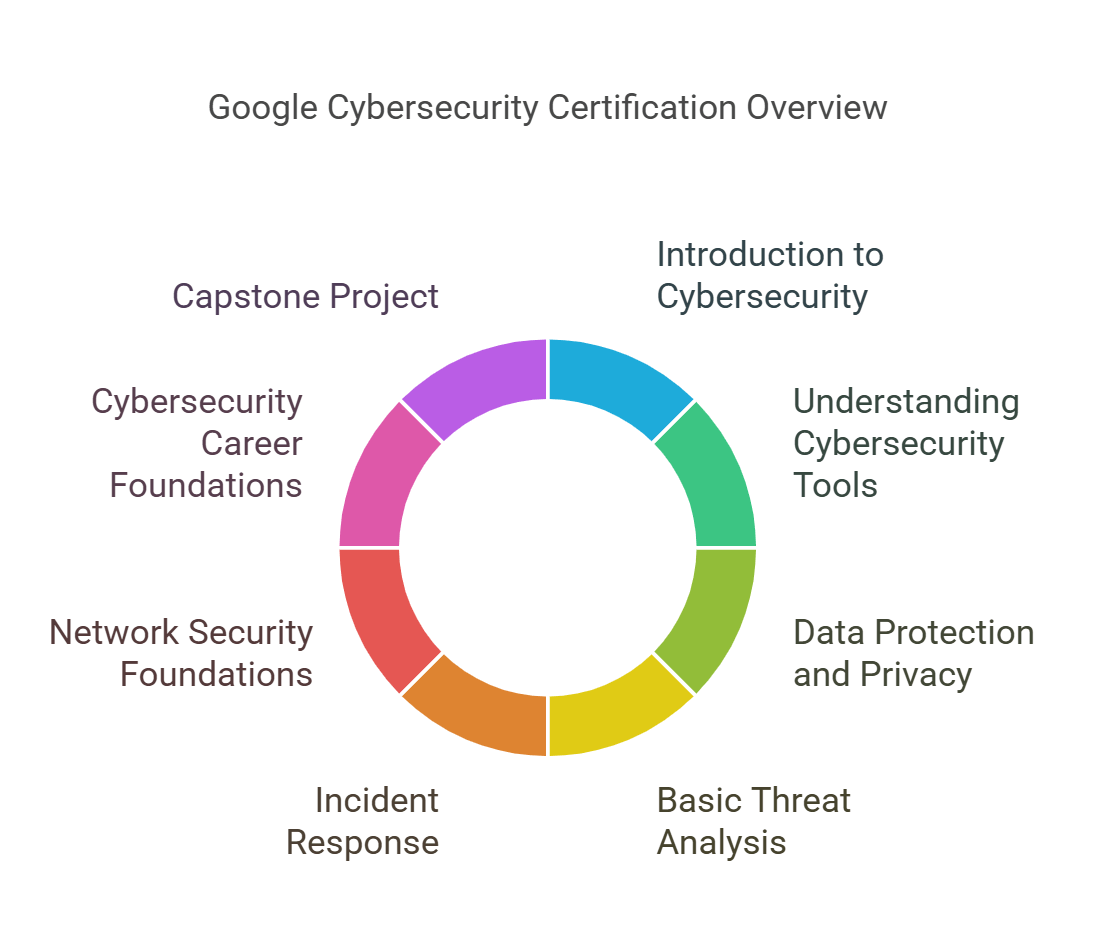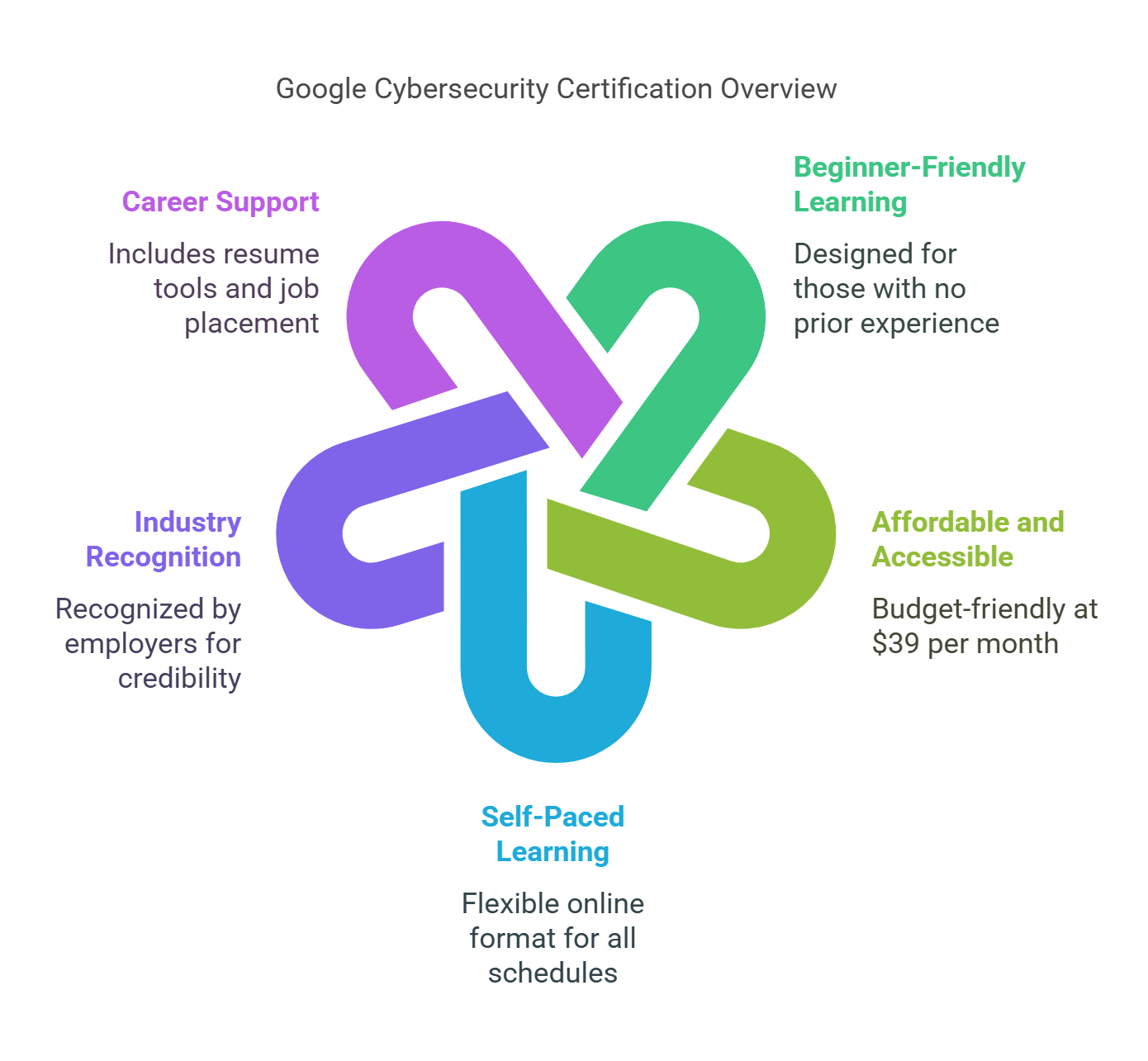Table of Contents
Cybersecurity is one of the fastest-growing fields in the tech industry. As businesses and individuals become more dependent on digital systems, the need for skilled cybersecurity professionals continues to rise. If you are looking for a Cybersecurity Certification Without Experience to start or advance your career, Google’s Cybersecurity Certification is a great option. But how many courses are included in Google Cybersecurity Certification? And how does it compare to the ACSMI Certification, which offers a more comprehensive learning experience?
In this blog, we will break down everything you need to know about Google’s Cybersecurity Certification in 2025. We will explore its courses, benefits, and career opportunities. Plus, we will compare it with the ACSMI Certification to help you decide which one is the best for your career growth.
How Many Courses Are Included in Google Cybersecurity Certification?
Google Cybersecurity Certification includes eight courses. These courses cover all the foundational concepts of cybersecurity and prepare beginners for entry-level cybersecurity jobs. Here is a breakdown of the eight core courses:

1. Introduction to Cybersecurity
This course provides an overview of cybersecurity concepts and best practices. It introduces students to:
-
Basic cybersecurity terminology and principles.
-
Common cyber threats such as phishing, malware, and social engineering.
-
The importance of cybersecurity in protecting digital assets.
2. Understanding Cybersecurity Tools
To work in cybersecurity, professionals must be familiar with the tools used to protect networks and data. This course covers:
-
Firewalls and how they prevent unauthorized access.
-
Antivirus software and malware protection.
-
Network monitoring tools and security analytics.
3. Data Protection and Privacy
Data protection is one of the most critical aspects of cybersecurity. In this course, students learn:
-
How to secure personal and organizational data.
-
Data encryption techniques and secure storage practices.
-
Compliance with global privacy laws and regulations.
4. Basic Threat Analysis
Understanding cyber threats is key to preventing attacks. This course includes:
-
Identifying different types of cyber threats.
-
Analyzing and assessing cybersecurity risks.
-
Implementing threat mitigation strategies.
5. Incident Response
Cybersecurity professionals must know how to respond to security breaches. This course covers:
-
Steps for detecting and responding to cyber incidents.
-
Recovery strategies to minimize damage after an attack.
-
Reporting and documentation of security incidents.
6. Network Security Foundations
Network security is crucial for safeguarding systems from attacks. This course explains:
-
Fundamentals of securing network architectures.
-
Network security protocols and best practices.
-
How to monitor and protect network traffic from unauthorized access.
7. Cybersecurity Career Foundations
Getting started in cybersecurity requires more than just technical skills. This course provides:
-
Resume-building tips for cybersecurity job seekers.
-
Guidance on job interviews and career growth.
-
An overview of different cybersecurity roles and career paths.
8. Capstone Project
The final course is a hands-on project where students apply everything they have learned. It involves:
-
Simulating real-world cybersecurity challenges.
-
Using security tools to detect and prevent threats.
-
Presenting solutions and documenting findings.
What Makes Google Cybersecurity Certification Unique?
Google’s Cybersecurity Certification stands out for several reasons:

1. Beginner-Friendly Learning
The courses are designed for individuals with no prior cybersecurity experience. They use simple language, interactive content, and step-by-step guidance.
2. Affordable and Accessible
Unlike expensive cybersecurity certifications, Google’s program is budget-friendly. It is available on Coursera for approximately $39 per month, making it an affordable option for learners worldwide.
3. Self-Paced Learning
With a flexible online format, students can complete the courses at their own pace. Whether you have a full-time job or other commitments, you can learn at a speed that suits you.
4. Google’s Industry Recognition
A certificate from Google carries credibility in the job market. Many employers recognize Google’s certification as a strong foundation for entry-level cybersecurity roles.
5. Career Support and Job Assistance
The program includes career resources such as resume-building tools, interview preparation, and job placement support. Google also connects students with hiring partners looking for cybersecurity professionals.
How Does Google Cybersecurity Certification Compare to ACSMI Certification?
While Google’s certification is a great starting point, it primarily covers basic cybersecurity concepts. For professionals who want to specialize in advanced cybersecurity roles, the Cybersecurity Certification Course Free ACSMI Certification offers a more comprehensive learning experience.
Why Consider ACSMI Certification?
-
More In-Depth Curriculum: ACSMI includes over 400 modules, covering advanced topics like ethical hacking, cryptography, penetration testing, and cloud security.
-
Hands-On Labs: Unlike Google’s program, ACSMI provides hands-on labs where students work with real security tools and attack simulations.
-
Career Advancement: ACSMI is recognized globally for preparing students for high-paying cybersecurity jobs.
-
Advanced Specializations: Learners can choose specialized tracks like Incident Response, Network Security, Cyber Forensics, and Risk Management.
If you want to build a long-term career in cybersecurity, starting with Google’s certification and advancing with ACSMI can give you a competitive edge in the job market.
Final Thoughts
Google’s Cybersecurity Certification in 2025 is an excellent option for beginners looking to start a cybersecurity career. It offers an affordable and flexible learning experience with industry-recognized certification. However, for professionals aiming for specialized roles and higher salaries, ACSMI Certification provides the advanced knowledge and practical skills needed to succeed.
By combining Google’s foundational program with ACSMI’s advanced modules, you can build a strong cybersecurity career and stay ahead in this fast-growing field. Start your journey today and take the first step toward becoming a cybersecurity expert!
FAQs About Google Cybersecurity Certification
1. How long does it take to complete Google’s Cybersecurity Certificate?
Most students complete the certification in 4 to 6 months, dedicating 5-10 hours per week to learning.
2. Is Google Cybersecurity Certification enough to get a job?
Google’s certification provides a strong foundation for entry-level cybersecurity jobs. However, for mid-level and specialized roles, additional certifications like ACSMI are recommended.
3. Can I complete the courses at my own pace?
Yes, the certification is self-paced, allowing you to learn anytime and anywhere.
4. What jobs can I get after completing Google’s Cybersecurity Certificate?
You can apply for jobs like Cybersecurity Analyst, IT Security Specialist, and Network Security Engineer.
5. Does Google’s certification require prior IT experience?
No, it is designed for beginners with no prior knowledge of IT or cybersecurity.
6. How much does Google Cybersecurity Certification cost?
The certification costs around $39 per month on Coursera.
7. Is Google’s Cybersecurity Certification recognized by employers?
Yes, it is recognized as an entry-level credential by many tech companies and security firms.
8. How does ACSMI Certification complement Google’s courses?
ACSMI provides advanced skills and hands-on training, preparing professionals for high-paying cybersecurity roles.

Leave a Reply